Honest debate needed to avoid repeat of Oldham race riots 20 years ago
by Barnie Choudhury
“Virulent racists” are harming the chances of racial harmony in Britain.
That is one of the conclusions of Professor Ted Cantle, the man tasked by Tony Blair’s government to investigate the causes of a series of race riots 20 years ago.
This week (26) in 2001, Oldham erupted in flames as months of racial tensions boiled over into frustration, leading south Asian and white youths to hurl petrol bombs and missiles at the police.
Speaking during a documentary series for BBC Radio 4, the founder of the Institute of Community Cohesion (iCoCo) said while “community cohesion” had improved over the past two decades, the danger signs of divided communities remained.
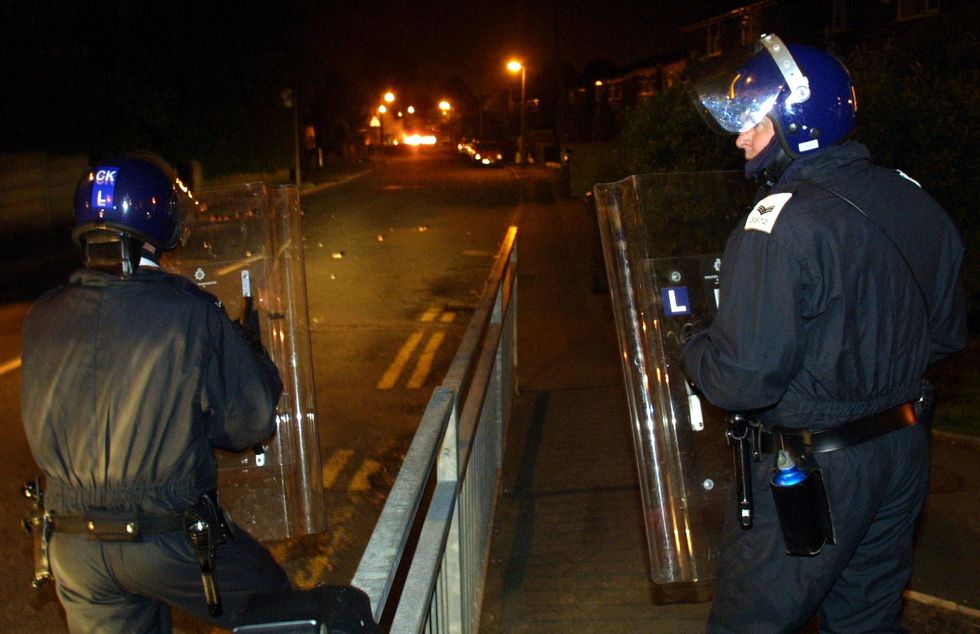
“There is a strong minority which is really virulently racist, probably misogynistic too, against any sense of change,” Cantle said. “We have more a general swathe of opinion which is positive.
“But we now have growing much more vocal minority, often stirred up by politicians, not necessarily in this country, but from elsewhere, who are much more prepared to be vocal and aggressive and hostile and abusive.”
That “vocal minority” could be found on social media and spread by politicians here and abroad, he said.
“Many European populist leaders have influence too. Many religious leaders now have influence across communities through social media in ways that they never did before.
“So, these strong, abusive, hostile, aggressive views do obviously impact on people across the UK in local communities.”
After the summer of riots in 2001, the government tasked Cantle to lead an independent group to examine why some towns and cities had succumbed to violence.
His seminal report concluded that weak leadership, social deprivation, government policy of single faith schools and a lack of trust in the police were all factors.
But Cantle’s biggest concern was that south Asians and white communities never mixed, leading him to coin the term “parallel lives”.
Communication was a massive problem, he concluded.
Honest debate
His review team found that both communities felt that the other was getting preferential treatment from local and national government.
That need for “honest debate” remains today, he told the BBC.
“People do feel aggrieved, they do feel their identity is changing, particularly the white British community, and there's a sense of denial about that debate,” Cantle explained.
“Part of this problem is that we actually have to have a much more honest and open debate. We have to deal with the grievances, not pretend that they don't exist.
“Even if people are prepared to express quite hostile and abusive views, we still have to actually deal with them, and try and, in some way, bring them around to a much more responsible position.”
The then police minister, John Denham, oversaw the different reports into the northern riots.
He was not surprised by the eruption in violence.
“What became pretty clear was some pretty major failings in public policy, where this had been developing for years, and nobody thought they should do anything about it,” Denham recounted.
“What the riots brought home was the depth of what could go wrong, if you just say, well, that's the way things are, we don't need to do anything about it, that everyone keeps to themselves, that’s fine.”
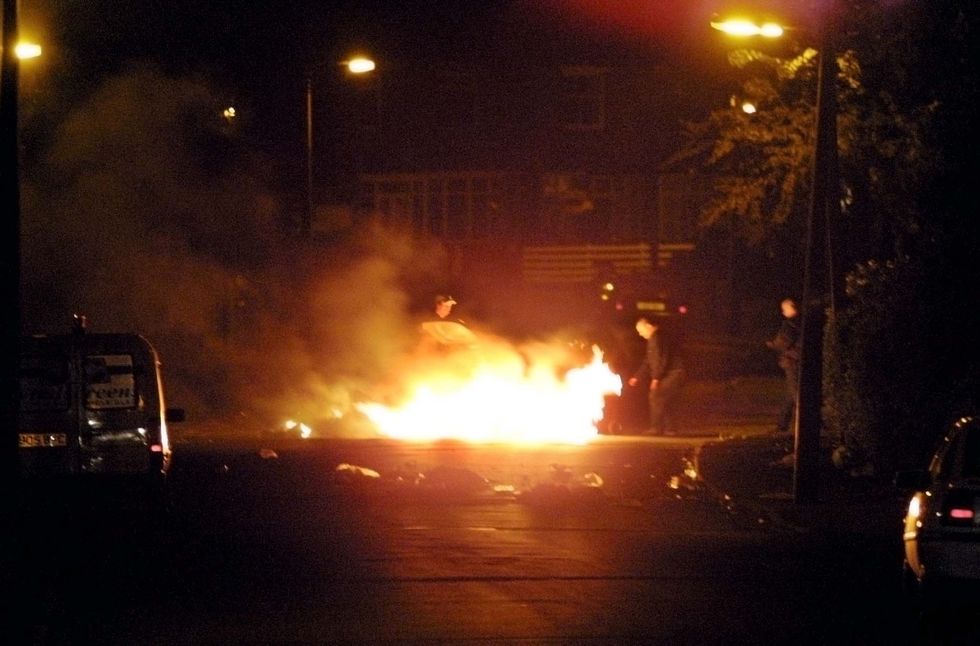
Independent review
The former minister also thought that some local leaders played “community politics one way in one place, one place in another”.
“What really happened in that summer of riots was it held a mirror up to people and said, look, we've been letting this happen. We thought it was all fine, and it's not going to be fine, unless we try and do something about it.”
Denham’s boss at the time was, David, now Lord, Blunkett.
He became home secretary a fortnight after the riots in Oldham. But it was not until after the Bradford disturbances in July that he ordered a review.
In the meantime, Burnley and Leeds witnessed unrest, and Stoke followed a week after Bradford.
“Whilst there may have been common causes, they were very different,” Blunkett remembered. “They are different cities, towns. They have different histories and backgrounds.
“But they were all affected by what was then the National Front, and the ability of the far right to exploit, sometimes genuine, sometimes perceived, grievances.”
That summer, he recalled, speeded up the lessons of what good community cohesion looked like.
“I'd already clocked that, with the best possible intentions, some of the urban renewal programmes were not really being worked on the right lines,” said Blunkett. “People meant well in terms of focusing resources on where they felt that historic inequalities were worst.
“But when you do that in a way that divides a community on ethnic grounds, you're creating a tinderbox.
“So, there were some major lessons that we were starting to realise before the disturbances took place. They obviously accelerated, rather graphically, that learning curve.”
Speak to people who were there at the time Oldham exploded in violence, and they will tell you that the far-right took advantage of community divisions.
Oldham caught out
The British National Party (BNP), the NF and Combat 18 were fomenting hatred. South Asian youths played into their hands when they attacked a 76-year-old war veteran, Walter Chamberlain.
“I don't think any of us expected to get as bad as it did,” Riaz Ahmad said.
He was the deputy mayor of Oldham in 2001, five years after becoming a councillor.
“Although indicators were there, there was tensions, and the BNP was coming to town every week, every Saturday.
“We thought it would blow over. Then suddenly it erupted, and when it erupted, I don't think any of us were prepared or anticipated that it could get this bad.
“It was a complete and utter surprise.”
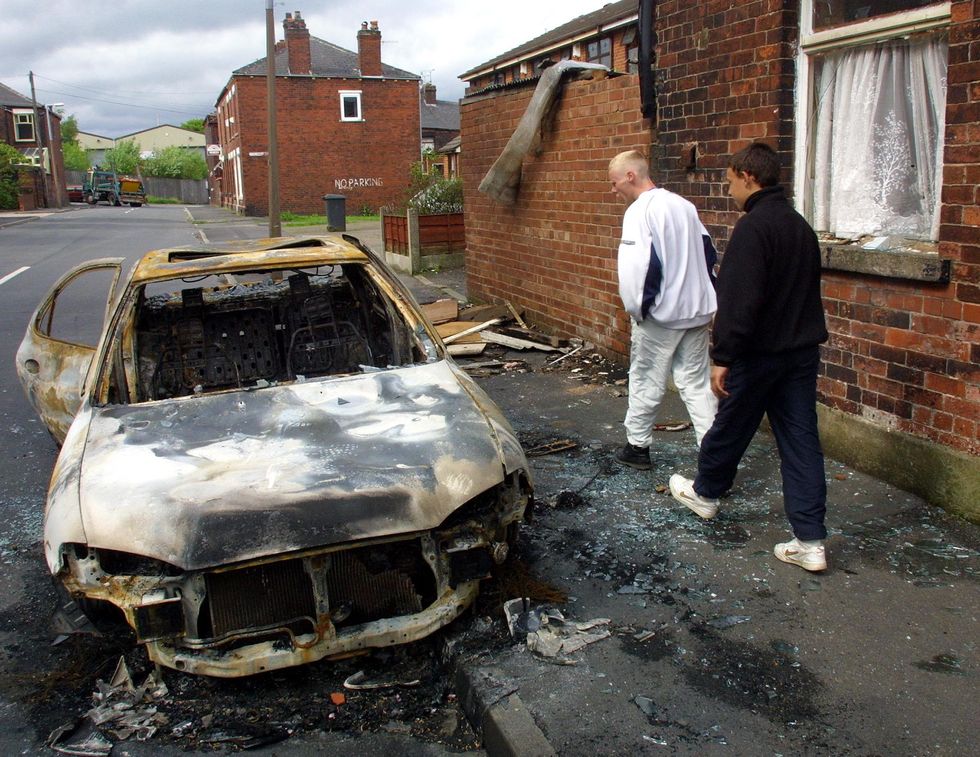
Ahmad was a victim of the riots. In the middle of the night arsonists firebombed his home while his family and he were asleep.
In 2001, south Asian residents complained the police did nothing to stop right-wing groups from marching through areas in which they lived.
And that mistrust in the police was amplified by rumours that they deliberately targeted south Asians for punitive punishment.
Noor Miah still lives in Coldhurst, a predominantly Bangladeshi area of Oldham. He was 21 at the time, and he was arrested and jailed for four years for rioting.
Miah said he stepped outside his house and moments later he was running because some youths told him the police were chasing rioters.
“Even after 20 years, it's five seconds, not even five seconds. All I had to do was go in, and that was it,” he said. “My life would have been completely different because I ran with them.
“Everything just changed in that five seconds. It just changed everything. I didn't have to run. But at the same time, I don't know why I ran because I was literally in front of my house. I regret everything.”
Despite serving almost four years, to this day he maintains he was in the wrong place at the wrong time, and that the police got the wrong man.
Contradictory messages
John Denham is now a professor at the University of Southampton.
He left parliament in 2015, but the former police minister believes the service has made “a lot of gains”.
“I think things probably are better than they were 20 years ago,” he said. “I think that the idea of dealing with race issues differently would be much more deeply ingrained at management and senior levels in the police force.
“It was 20 years ago, when there were still some people just denying there was an issue [with race], although that was changing, because of Macpherson. But there's still ground to be made up, obviously.”
His old boss goes further. Lord Blunkett said he believed the police were getting contradictory messages from the government.
“I thought we'd started to make some real progress with recognition of those challenges, I think we've seen over recent times, a step backwards,” the former home secretary told the BBC.
“I'd like us to learn rather quickly, and certainly not to enforce by legislation, things that the police simply could not manage to implement, because of the contradictions built into them.
“We tend to reinvent the wheel rather than understanding which direction that we always come from, and therefore we don't let the police build on the best practice that has taken place.”
Maturity
But things have changed for the better in Oldham, according to those who live in the town.
Former mayor, Riaz Ahmad, said while no-one was complacent anymore, he did not think there would be another riot anytime soon in his town.
“We had an influx of east European community coming into Oldham over the last 15 years, and that would have caused a lot of tensions,” he explained. “But because of the experience of 2001, the police, the local authority, the voluntary sector, the community, we dealt with that issue in such a mature manner.
“We made sure we did not have any community tensions. So, I think Oldham, as a result of 2001, as was said at the time, we lost our innocence, but we gained our maturity.”
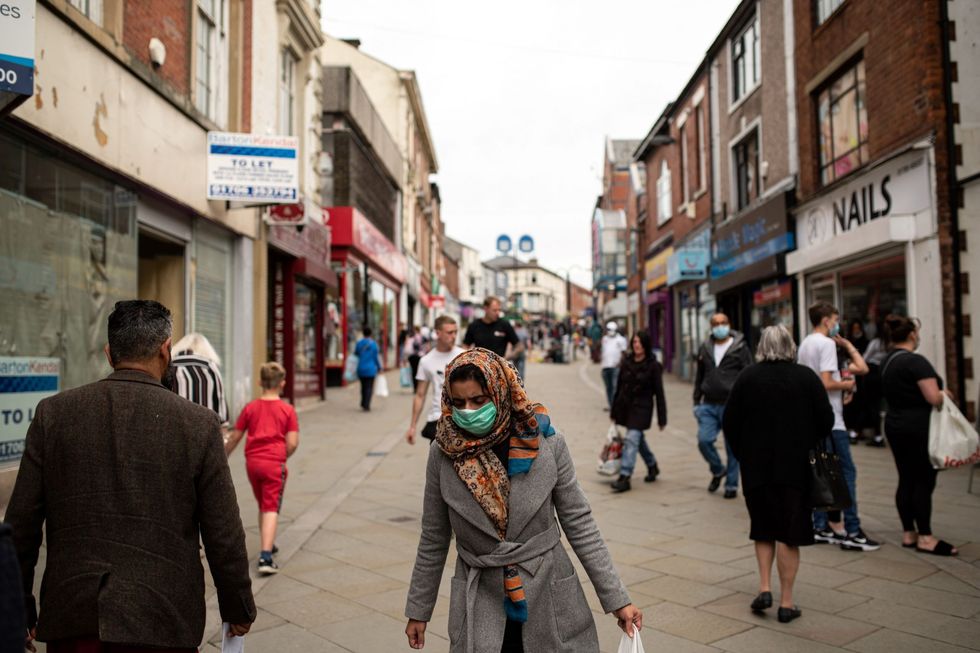
But the man responsible for leading the independent review into the northern riots of 2001 sounds a note of caution.
“In some other areas where there are still deeply segregated communities deeply segregated views, then we have to actually have some very difficult conversations with both sides of those communities,” he warned.
“I think that will also mean putting real resources in to tackling some of the disadvantages of the inequalities to really addressing the grievances.”
Proper resourcing
Cantle is urging government to realise that those “real resources” are inexpensive, running into hundreds of thousands of pounds, rather than millions and millions of pounds.
He remains convinced that segregation continues to affect Britain.
“We really cannot go on with the level of school segregation that we have,” said Cantle. “In some towns and cities, the school segregation has got worse and worse.
“And if a school is segregated, it means the parents have a segregated social network and community network. It's very difficult to bring communities together when schools are so segregated.”
But what chance of the government accepting and solving segregation when its own taskforce concluded that Britain was no longer institutionally racist?
“I looked at the way they defined institutional racism and systemic racism, and that didn't really accord with my experience,” explained Cantle. “They needed to understand is that it's not an institution that discriminates. It's the people within that.
“It's their culture and behaviours, it's the processes and procedures, which are all man made. Therefore, they can be changed. Everything that goes on within an institution is controlled and governed by the attitudes and values of the people within it.
“And so, if we see that there is some really hostile and abusive behaviour going on, then it has to come from people within institutions. It has to be addressed.”
You can hear Barnie Choudhury’s Parallel Lives series on BBC Sounds. The Oldham episode can be found here https://www.bbc.co.uk/programmes/m000vx2y.
‘We’ll live with it for the rest of our lives’
“Being a leading counsellor, I would go around every evening, every night, reassuring the communities because there was complete mistrust within the community. But I would reassure them, keeping guard every night. And it was very, very long hours. I remember that I came back home at two o'clock in the morning, and I went to bed. About four o'clock, my daughter came down, and she woke me up. She said, the house is on fire, and so I immediately asked her to get the children. I had three boys and one girl. But the dilemma was, do we go out? The perpetrators might be waiting outside. The fire brigade, in those days wouldn't come straight away, and they will have to wait for a police escort. So, it felt like we were waiting forever for the fire brigade to turn up to put the fire out.
“It was a nightmare that we had to live while we were awake. We were just waiting outside and seeing our house burning down. We built that house. We decorated it ourselves, and we did a lot of work on that house. And we're seeing that is kind of nest that you built burning, and it's burning in front of your eyes. As I saw the smoke coming out and engulfing the house. It was very, very tragic. And the police and fire brought the fire under control, and they came up with some evidence that it was a petrol bomb which made them realise this was arson. They just said you need to go a safe house because this was a targeted attack, and things are getting out of hand.
“I think we will live with it for the rest of our lives. It's not something that you can just wipe off your memories. The children were very young, and we rebuilt the house, and we just couldn't get any peace in that house. I would wake up in the middle of the night and I could smell fire, I could smell smoke. And I know there was nothing, it was just in your mind all the time. So eventually, we ended up leaving the house and moving somewhere else just to get away from those terrible, terrible memories.
“It was a very professional job, whoever did it, they left no traces. But I'm still hoping that one day, whoever has done that will be brought before the criminal justice system and pay the price.”
‘A Muslim consciousness began to emerge after the 9-11 US attacks’
Ted Cantle and how 11 September 2001 affected the Cantle Report
How much did faith play a part in your review?
We were guided by the communities that we spoke to, and when we asked them about how they were described and how they described others, there were only two terms Asian and white. The word Muslim, for example, or any other faith was hardly ever mentioned. Obviously 9-11 tended to change that situation on both sides. It enabled a Muslim consciousness, and at the same time, those who were not Muslim, to actually begin to identify that as a separate community. But it did take some time. I would say it took two or three years really for that to become a really important descriptor and characteristic. It wasn't until we saw the advent of the Prevent programme a few years later that we really began to see a tension between cohesion and anti-terrorism work. So, we had a few years really to adjust. The Muslim community really emerged as a particular force from that point on, and that's obviously something that we've had to deal with. A lot of organisations have begun interfaith work as a consequence, which is also a bridge-building operation.
How much did the war on terror affect your work?
Particularly after the London bombings, particularly after the emergence of the Prevent programme, we had a few years really where more generic cohesion work was beginning to get established. But in due course that did happen. That obviously meant that the focus shifted. We also, in 2010, had a change in government. And where we had had a duty to promote community cohesion in schools, that was suddenly removed from the Ofsted regime by the incoming government, which was a complete shock. And that was probably one of the most powerful tools we have at that time, which was completely changed.
How much did this change affect what you were trying to do?
The incoming government [of 2010] said they did not have an integration strategy, certainly didn't devise one, didn't want to implement one, didn't want to use cohesion as a term. And it's only more recently, actually, that we now have an integration strategy with integration areas. It's come back onto the agenda in quite a big way. But certainly, at that time, it did lose focus.
So, we've lost almost a decade?
Well, not completely a decade because local authorities, a lot of voluntary organisations, even some businesses have been preparing programmes over that period. There has been a lot of interfaith work, things like the school linking network, but it wasn't government led. It was led more from a bottom-up point of view from different community organisations. It, now I think, needs pulling together and recognising as a much broader programme.
‘We had to defend our integrity three times’
by Barnie Choudhury
The story of the northern riots started for me on 19 April 2001. After weeks of investigating a tip off from my BBC Asian Network colleague, Rahila Bano, my producer and had discovered that parts Oldham had become “no-go zones” for white people. That day, Greater Manchester Police held a news conference to discredit my report on BBC Radio 4’s Today programme.
Over the next six weeks, I travelled across the north and north-west charting the rise of the far-right, and in particular the British National Party. At 11.50pm on Saturday 26 May 2001, the BBC’s news desk in London phoned me at home with the words I will never forget.
“Oldham is on fire, and we need you there”, said the news organiser.
By the time I had arrived at 3am, violent skirmishes were raging, and I felt I was on the set of a movie. Black, acrid fumes lit the Oldham sky. As I was driving, three south Asian youths ran in front of my car, demanding that I got them away. I did so, but not before they gave me an interview.
The following three nights were frightening. The police tried to blame me for inciting the riots. All I felt was a sense of vindication. Not in the “I told you so” sense of vindication. The vindication that lots of people, not just me, had been warning the elders, the police, the community, and elected leaders, and they had buried their heads in the sand.
Some south Asian BBC colleagues thought I had betrayed my community, that I had been a puppet for white producers and editors. Conversely, one senior white correspondent asked me pointedly whether I was making it all up. Under the guise of “trying to learn lessons”, the BBC launched two editorial hearings. The Today programme editor, Rod Liddle, planning producer, Iain Croft, and I found ourselves having to defend our integrity. Not once. Not twice. But three times. The final time was in front of an audience at a conference which, if memory serves, the Guardian organised.
For someone who had fulfilled his boyhood dream of becoming a national reporter for the best news organisation in the world, I felt immensely vulnerable. People criticise Rod Liddle, accusing him of being a racist. All I can say is that he is one of the most inspirational editors I have had the privilege to work for. Demanding, firm but fair and certainly not racist, and I should know because I came across covert, subtle racism in the BBC.
Liddle continued to have faith when others wavered. He knew that I faced death threats as I spent 2001 travelling around the country tracking the rise of far-right groups and chronicling racial tensions spilling over into violence. By December 2001, when Professor Ted Cantle published his report, I know my judgement had been sound.
I met the then home secretary, David Blunkett, in 2003. He said something which humbled me, and I will never forget. “Ah, Barnie. We heard your reports and spoke about them at cabinet, and we acted on them.” It was then I knew, that for a brown, working class, boy from Coventry, journalism was the right career for me.


















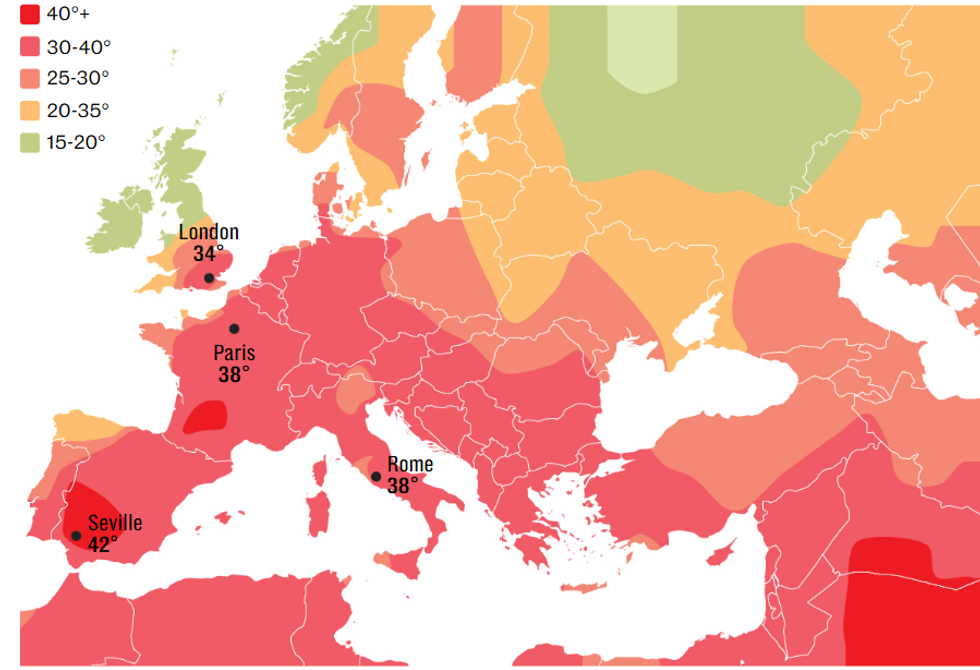 June 2025 was England’s warmest June since records began in 1884Met Office
June 2025 was England’s warmest June since records began in 1884Met Office